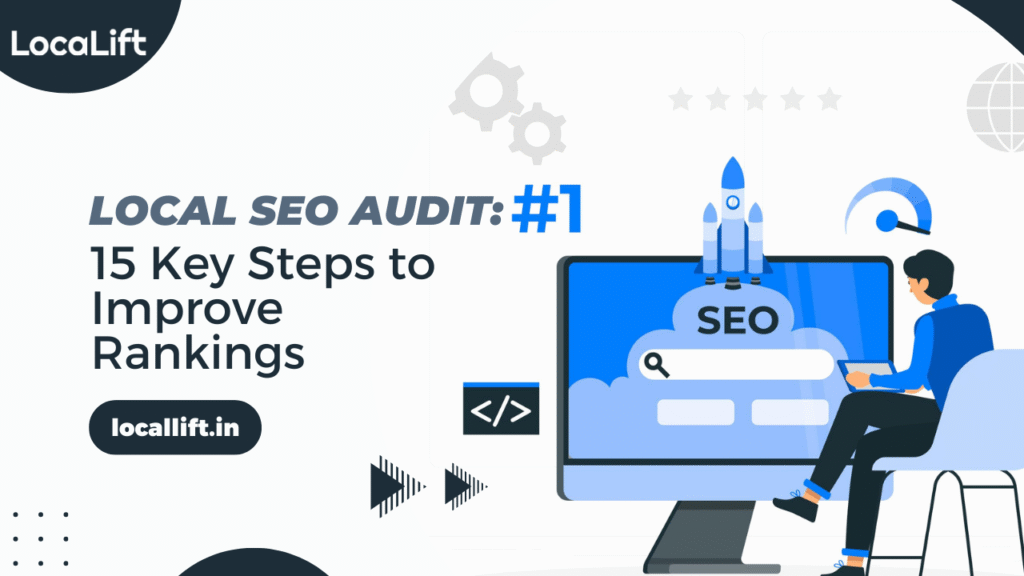Local SEO audit is the backbone of any successful local search strategy. It ensures your business stands out in local search results, driving traffic and leads. By conducting a local SEO audit, you can uncover opportunities for improvement and address issues that may be hindering your rankings. This process is essential for businesses aiming to thrive in a competitive local market.
With the ever-evolving nature of search engine algorithms and user behavior, keeping your local SEO strategy up-to-date is vital. A detailed local SEO audit provides actionable insights, ensuring that every aspect of your online presence is optimized for success. From evaluating your Google Business Profile to analyzing backlinks, a thorough audit empowers businesses to make data-driven decisions and achieve measurable results.
What is a Local SEO Audit?
A local SEO audit is an in-depth analysis of your business’s online presence and performance in local search results. It examines elements such as your Google Business Profile, website optimization, local keywords, backlinks, and more. The goal is to identify strengths, weaknesses, and opportunities to improve your local search rankings and attract more customers.
Why is a Local SEO Audit Important for You?
A local SEO audit is the key to building a strong online presence in your community. It helps you identify what’s working, fix what’s not, and ensures your business stands out in local searches. Here’s why it’s essential:
- Enhanced Visibility: It helps your business appear in local search results, ensuring potential customers find you easily.
- Improved ROI: By optimizing your local SEO efforts, you’ll attract more relevant traffic and improve conversion rates.
- Competitor Analysis: A local SEO audit provides insights into your competitors’ strategies, enabling you to stay ahead.
- Correct Errors: It identifies inconsistencies or issues in your online presence, such as inaccurate NAP (Name, Address, Phone number) data or harmful backlinks.
How to Perform a Local SEO Audit
Performing a local SEO audit is a systematic process that begins with evaluating your Google Business Profile. Ensure all information is accurate, complete, and optimized, including your business name, address, phone number, and category. Add high-quality images, videos, and respond to customer reviews to build trust and engagement.
Next, review your local business website to ensure it meets technical, on-page, and user experience standards. Mobile-friendliness, page speed, and clear navigation are crucial factors that influence rankings. Incorporate local keywords into meta tags, headers, and content while maintaining a natural flow to improve relevance.
Finally, analyze your backlinks, citations, and reviews. Identify harmful backlinks and disavow them to maintain a clean profile. Ensure NAP consistency across directories and encourage customers to leave positive reviews. These steps collectively enhance your local SEO performance, improving visibility and credibility.
What Things to Check in an SEO Audit
An SEO audit helps you identify strengths, fix weaknesses, and optimize your website for better performance. By focusing on key areas, you can ensure your site aligns with best practices and delivers value to both users and search engines. Here’s what to check:
- Relevancy: Ensure your content and keywords align with user intent. Relevant content helps search engines understand your offerings and improves rankings. For example, a restaurant should include keywords related to menu items, locations, and services to match customer searches.
- Consistency: Verify that your NAP data is consistent across all platforms, including your website, directories, and social media. Inconsistent information can confuse search engines and potential customers, reducing your credibility.
- Authority: Building domain authority is critical for SEO success. Strengthen your authority through quality backlinks from reputable websites. A higher domain authority signals trustworthiness to search engines, improving rankings.
- Usability: Optimize your website’s design, speed, and mobile responsiveness to enhance the user experience. A slow-loading or difficult-to-navigate site can increase bounce rates, negatively impacting your rankings.
- Engagement: Monitor customer interactions, reviews, and feedback. High engagement levels indicate that users find your content valuable and relevant, which can positively influence your rankings.
Local SEO Audit Checklist
Local SEO helps improve your business’s local search rankings by identifying key areas for optimization. This checklist will guide you through a comprehensive audit to enhance your local online presence.
- Google Business Profile
- Local Business Website
- Local Keyword Research
- Website Rankings
- Google Penalties
- Keyword Targeting
- Individual Page Evaluation
- Duplicate Content
- Technical SEO Recommendations
- Backlinks
- Links and Website Authority
- Citations
- Brand Mentions / Implied Links
- Reviews and Ratings
- Social Media Platforms
15 Key Steps for a Successful Local SEO Audit
Conducting a Local SEO Audit is essential to ensure your business ranks well in local search results. It involves evaluating various factors such as your Google Business Profile, website structure, local keyword research, and backlinks. A thorough audit helps identify areas for improvement and ensures your online presence is optimized to attract local customers.
1. Google Business Profile Optimization
Your Google Business Profile (GBP) is crucial for local search success. It directly impacts your visibility in local search results and Google Maps.
Make sure your profile is complete and up-to-date to appear in local search queries.
Key Considerations:
- Ensure that your business name, address, and phone number (NAP) are consistent with your website and other directories.
- Choose relevant business categories to make it easier for customers to find you.
- Upload high-quality photos and videos showcasing your products and services.
- Regularly post updates, promotions, and events to keep your profile fresh.
- Respond to customer reviews and encourage satisfied customers to leave feedback.
An optimized Google Business Profile enhances local visibility and builds trust with customers.
2. Local Business Website Optimization
Your website is your digital storefront, so it must be optimized for local SEO. This step involves ensuring that your website structure and content align with local search queries.
- Ensure that your website is mobile-friendly, as a significant portion of local searches comes from mobile devices.
- Implement HTTPS encryption for security and improved rankings.
- Add local schema markup to help search engines understand your business and its location better.
A well-optimized website ensures that users have a seamless experience while also helping search engines index your site more effectively.
3. Local Keyword Research
Keyword research is the backbone of any SEO strategy. For local SEO, focusing on location-specific terms is essential.
Key Actions:
- Use geo-targeted keywords like “best electrician in [city]” or “plumbing services near me.”
- Include long-tail keywords that reflect local search intent, such as “affordable hair salons in [city].”
- Analyze competitor websites to find keywords they are ranking for and identify potential gaps.
By identifying the right local keywords, you ensure your business appears in relevant local search queries.
4. Website Rankings
Tracking your website rankings is essential to gauge the success of your local SEO efforts.
- Use tools like Google Search Console to monitor your rankings for local search queries.
- Compare your rankings with local competitors to identify opportunities for improvement.
- Identify pages on your website that are already performing well and look for ways to enhance them further.
Monitoring rankings helps measure the effectiveness of your SEO strategy and helps you make data-driven decisions.
5. Check for Google Penalties
Google penalties can severely affect your website’s performance and visibility in search results. It’s crucial to check for any penalties and resolve them quickly.
- Check the Manual Actions Report in Google Search Console for any penalties.
- Investigate common penalty causes like thin content, unnatural backlinks, or spammy practices.
- If penalized, fix the issue and submit a reconsideration request to Google.
Addressing penalties ensures that your site is not being unfairly punished and can help you recover rankings.
6. Keyword Targeting
Targeting the right keywords is vital for ensuring that your content ranks for terms that are relevant to your audience and location.
- Ensure that target keywords are strategically placed in your titles, meta descriptions, and headers.
- Focus on local intent keywords like “best coffee shop in [city]” or “top dentist near me.”
- Track keyword performance to refine your strategy over time.
Proper keyword targeting allows you to attract highly relevant local traffic to your website.
7. Individual Page Evaluation
Each page on your website should be optimized for local SEO. A thorough page-by-page evaluation is essential to ensure every page is working effectively.
- Evaluate on-page SEO elements such as titles, meta descriptions, and URL structure to ensure they are optimized for local keywords.
- Make sure each page has unique content that serves a specific purpose and answers user queries.
By optimizing individual pages, you increase the likelihood of ranking for a wider range of local search terms.
8. Duplicate Content
Duplicate content can confuse search engines and negatively impact rankings. Identifying and addressing duplicate content issues is an essential part of your SEO audit.
- Use tools like Copyscape to identify duplicate content across your site and on the web.
- Implement canonical tags to signal the preferred version of a page.
- Ensure that each page has unique content that offers value to users.
By removing or fixing duplicate content, you help search engines index your content properly and avoid penalties.
9. Technical SEO Recommendations
Technical SEO ensures that your website is accessible to search engines and offers a smooth experience to users.
Key Considerations:
- Page speed: Optimize image sizes and enable caching to improve load times.
- Mobile optimization: Ensure your website is mobile-responsive for users on smartphones and tablets.
- XML sitemap and robots.txt: Ensure your XML sitemap is up-to-date and that the robots.txt file is optimized for crawlers.
By addressing technical issues, you improve both user experience and search engine crawlability.
10. Backlinks
High-quality backlinks play a significant role in improving your website’s authority and ranking potential.
- Focus on obtaining backlinks from authoritative, local sources such as local news outlets, directories, and community organizations.
- Use tools like Ahrefs or SEMrush to monitor your backlink profile and ensure it’s clean and diverse.
A strong backlink profile from trusted local sites enhances your site’s credibility and boosts local rankings.
11. Links and Website Authority
The overall authority of your website is determined by the quality and quantity of links pointing to your site.
- Internal Linking: Ensure that you have a solid internal linking structure to help search engines navigate your site.
- External Links: Earn high-quality backlinks from reputable and relevant websites.
- Trust Signals: Add trust signals like customer reviews, security certifications, and social proof to build authority.
The stronger your website’s authority, the higher your chances of ranking in local search results.
12. Citations
Citations are mentions of your business name, address, and phone number (NAP) on other websites. Consistent and accurate citations are essential for local SEO.
- Ensure your NAP is consistent across all local directories, including Google My Business, Yelp, and Yellow Pages.
- Check for duplicate or outdated citations and correct them.
Citations help search engines verify your business’s legitimacy and improve local rankings.
13. Brand Mentions / Implied Links
Even if not accompanied by a direct link, brand mentions (or implied links) play a role in local SEO.
- Monitor brand mentions using tools like Google Alerts.
- Reach out to websites that mention your brand without linking to you and ask for a backlink.
- Engage with users who mention your brand on social media or other platforms.
Brand mentions help establish authority and can lead to improved local search rankings.
14. Reviews and Ratings
Customer reviews are a vital ranking factor for local SEO. Positive reviews not only help you rank but also build trust with potential customers.
- Encourage happy customers to leave reviews on Google and other review platforms.
- Respond to reviews (both positive and negative) to show customer engagement.
- Focus on quality reviews, ensuring they reflect the true experience your business offers.
Positive reviews improve local SEO rankings and enhance your business’s reputation.
15. Social Media Platforms
While social media doesn’t directly impact SEO rankings, it is key in improving your local online presence.
- Be active on local social media platforms like Facebook, Instagram, and LinkedIn.
- Use location-based hashtags and geotags to make your content discoverable by local audiences.
- Share customer testimonials and reviews on social media to build trust.
A strong social media presence increases brand awareness and can drive traffic to your website, indirectly boosting your local SEO performance.
By following these 15 steps, you can ensure that your business is fully optimized for local search. Regular audits and ongoing adjustments are essential for staying ahead in the competitive local market. Each of these steps helps improve your website’s visibility, authority, and overall search engine performance, leading to better rankings and greater business success.
How Locallift Can Help Your Business
At Locallift, we specialize in local SEO audits and optimization. Our tailored services ensure your business achieves higher rankings, better visibility, and increased leads. Let us handle your local SEO needs while you focus on growing your business.
Ready to take your local search rankings to the next level? Schedule a free local SEO audit with us today and discover how we can help your business thrive in local search!
FAQ
1. How is local SEO measured?
Local SEO is measured by tracking organic traffic growth, search rankings, and user actions like clicks and calls. Tools like Google Analytics and Google Search Console provide insights into your website’s performance and local search visibility.
2. How do I track local SEO?
Track local SEO using Google Business Profile Insights to monitor calls, clicks, and views. Tools like SEMrush or Ahrefs help track local keyword rankings, while Google Analytics measures traffic and conversions to analyze campaign effectiveness.
3. How do mobile users influence local SEO?
Mobile users heavily influence local SEO as most local searches are done on mobile devices. Optimizing for mobile-friendly design and location-based keywords ensures better engagement and higher rankings for your business.
4. How often should I conduct a Local SEO Audit?
It’s recommended to perform a local SEO audit every 3-6 months or whenever there’s a significant change in your business, such as rebranding, location changes, or new competitors in your area.
Conclusion
A well-executed local SEO audit is not just a one-time task; it’s an ongoing process that ensures your business remains competitive in local search results. By systematically addressing each aspect of your online presence—be it your Google Business Profile, website optimization, or backlink strategy-you can build a robust foundation for sustained growth. Embrace the actionable insights from your audit to refine your strategy, enhance your visibility, and attract more local customers.
Local SEO audits are the bridge between where your business is and where it can go. Regularly revisiting your strategy and making data-driven adjustments will ensure your business stays ahead in the ever-evolving digital landscape.










